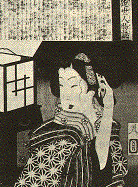
|
|
Around the 10th year of the Meiji Period, the power of the government had not yet been established. The prohibition of wearing swords and the abolition of inequality among all four classes meant that samurais lost their privileged status. Farmers had to pay more taxes than the tributes of former days. Revolts broke out here and there. The target of hate was the telegraph office, which symbolized the new civilization. In the ninth year of the Meiji Period (1876), a mob broke into the telegraph office in Kumamoto during the Shimpuren Revolt. A geisha named Kokatsu accompanying major general Taneda Masaaki, then commander in chief of the Kumamoto army corps, sent a telegram to her parents' house in Tokyo saying "My master is fatal and I am wounded." The wording of the telegram was admired as "having a note of (Seisho )Nagon and (Murasaki) Shikibu" because of its accurate and concise expression and it is said that it became very popular as a dodoitsu song.
|